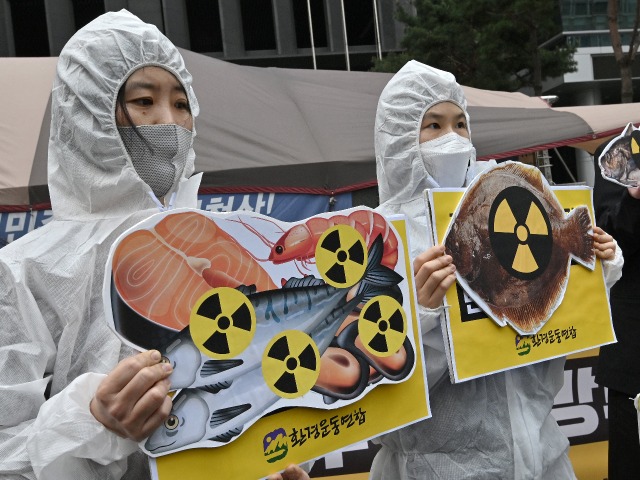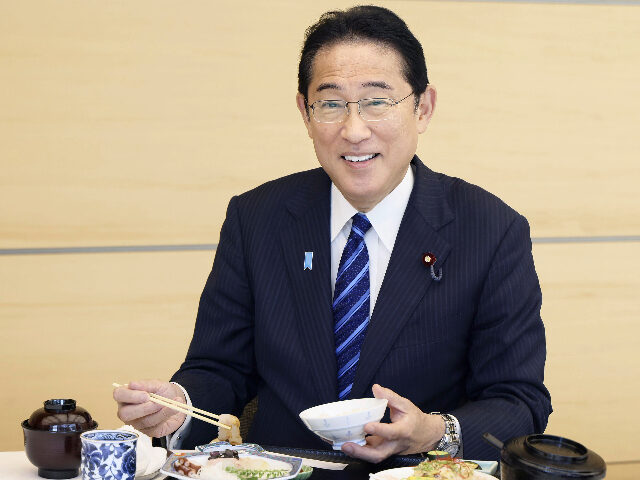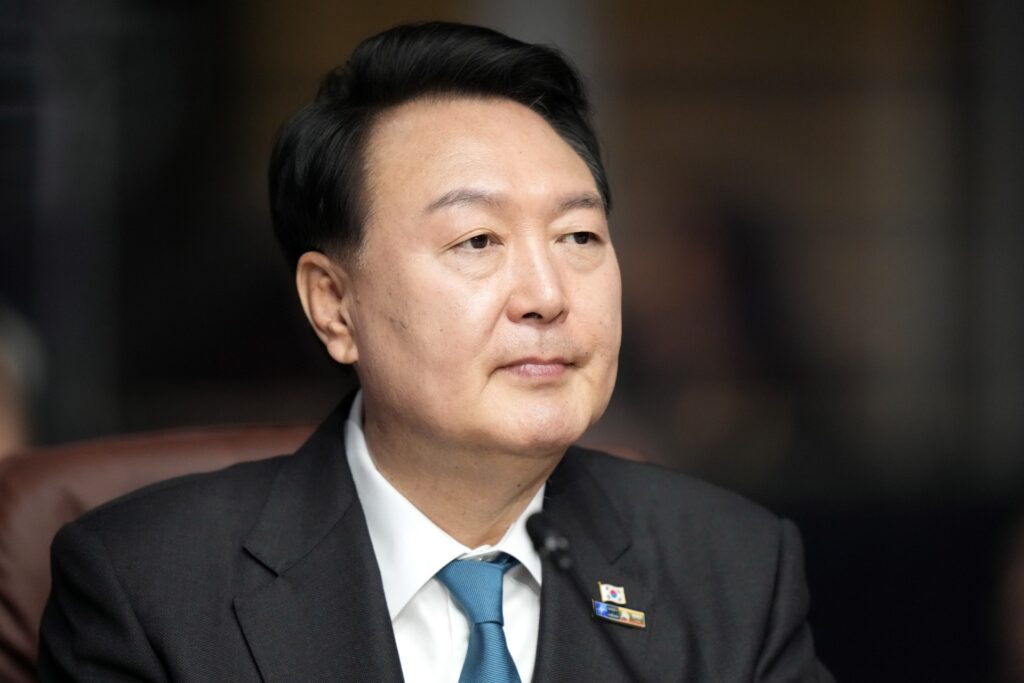Japanese Prime Minister Kishida Fumio dined on seafood from the coast of Fukushima at lunch on Thursday to demonstrate that the fish are safe to eat after the release of treated wastewater from the 2011 nuclear disaster.
“It is important to show safety based on scientific evidence and resolutely disseminate (the information) in and outside of Japan,” declared Economy and Industry Minister Yasutoshi Nishimura, one of three top ministers to join Kishida for lunch. After lunch, he proceeded to a Fukushima supermarket to sample its seafood.
Nishimura said the lunch was a demonstration of the Kishida administration’s “strong commitment to take the leadership in tackling reputational damage while standing by the feelings of the fisheries community in Fukushima.”
The menu included sashimi with flounder, octopus, and sea bass, plus rice harvested from the Fukushima region. Reporters followed Kishida and his party as they purchased food from a Fukushima fishmonger.
Kishida pronounced the meal “safe and delicious.”
“This is very good,” he murmured in a video of the lunch distributed by his office.
The Fukushima wastewater release has been a major source of tension between Japan and its neighbors, especially South Korea and China.
Japan studied the treated water for years and obtained numerous scientific opinions that it would be safe to release it into the ocean, dispersing the already harmless trace amounts of tritium that could not be purged from the million tons of water into the vastness of the sea. Japanese officials pointed out that the storage tanks for the water were filling rapidly after more than a decade, so releasing some water to make room in storage was inevitable.
South Korea reacted to the imminent release by panic-buying sea salt and threatening bans on Japanese seafood. Boycotts against other Japanese products were organized in South Korea to protest the release.
Some South Korean politicians suggested banning Japanese seafood products until the tritium in the wastewater becomes completely inert. That would be quite a wait, as Japan plans to release the treated water over a span of 30 years, and tritium has a half-life of 12 years.

South Korean environmental activists wearing protective clothing hold pictures of fishes with radioactivity warning signs during a protest against Japan’s decision to release Fukushima wastewater in Seoul on April 13, 2021. (JUNG YEON-JE/AFP via Getty Images)
South Korean President Yoon Suk-yeol announced on Wednesday that he would lunch on nothing but seafood for a week, encouraging his citizens to eat with equal “confidence.”
Yoon was more directly concerned with the South Korean seafood industry, which is nervous about consumers deciding if enough Fukushima wastewater would reach South Korea’s shores to render its own ocean products unsafe. South Korean media reported demand for seafood is already plummeting, prompting angry fishermen to stage demonstrations against Japan.
Yoon has been castigated by the South Korean left for not doing more to prevent the Fukushima wastewater release or for not driving a harder bargain to support it. Some of his critics think he should have linked the Fukushima issue more strongly to South Korea’s other disputes with Japan, particularly the legacy of the Japanese occupation of Korea during World War 2.
The barrage of criticism has pushed Yoon’s approval ratings down a little, reversing a modest upward trend in July. Yoon’s People Power Party (PPP) is now running neck-and-neck with the left-wing Democratic Party of Korea (DPK) in next year’s elections.
Communist China, meanwhile, has been as charming as ever, suggesting that Japan ship the Fukushima wastewater to America instead of dumping it in the ocean.
China launched a bizarre campaign of harassment against Japan over the past week, flooding Japanese switchboards with abusive phone calls after a state-controlled social media page published the phone numbers of Japanese government agencies. Chinese propagandists began churning out paintings of the giant radioactive monsters Japan is allegedly unleashing upon the world. Chinese teachers told their students the radioactive Fukushima water might cause them to mutate.
China banned all seafood from Japan last week, and its regulators suggested it might widen the ban to include other foreign imports that could be tainted with Fukushima water. Tokyo Electric Power Company (TEPCO), which manages the Fukushima facility, announced that it would compensate Japanese exporters harmed by China’s ban.
“We will keep strongly requesting that the Chinese government firmly carry out a scientific discussion,” Kishida said last week, urging Beijing to lift the ban immediately.
The far-left New York Times (NYT) on Thursday reported that China is waging a massive disinformation campaign against Fukushima, and some of the disinformation is more subtle than drawings of 400-foot-tall mutated fish monsters vomiting nuclear waste on beachgoers:
According to Logically, a tech start-up that helps governments and businesses counter disinformation, social media posts mentioning Fukushima by Chinese state media, officials or pro-China influencers have increased by a factor of 15 since the beginning of the year.
The posts have not necessarily disseminated baldly false information so much as left out crucial details, like the fact that Japan is removing virtually all of the radioactive material before discharging the water. They also do not acknowledge that Chinese nuclear power plants themselves discharge wastewater with much higher levels of radioactive material than the water coming out of Fukushima.
The state-owned China Central Television and China Global Television Network have run paid ads denouncing the water release on Facebook or Instagram in multiple countries and languages, including English, German and Khmer.
China’s objective seems to be discrediting Japan and, by extension, its close ally, the United States, so it can peel more Asian nations away from the U.S. alliance. Ironically, the Chinese Communist Party’s job is made easier because endless agricultural and pharmaceutical scandals in China — not to mention the Wuhan coronavirus pandemic — have made the population very receptive to fear-mongering about food safety.
“There is more tritium in water being discharged by nuclear power plants in China and in South Korea, where protesters have also condemned the Japanese release,” the NYT noted truculently.


COMMENTS
Please let us know if you're having issues with commenting.